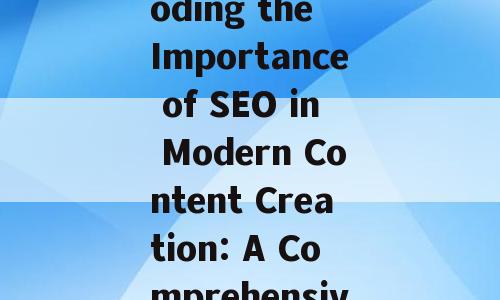Introduction:
In the digital age, the significance of SEO (Search Engine Optimization) in content creation cannot be overstated. As the landscape of online content continues to evolve, understanding how SEO impacts your writing is crucial for reaching a wider audience and ensuring your content stands out. This article delves into the intricacies of SEO, providing a comprehensive guide to help writers and content creators navigate the complexities of optimizing their content for search engines.
The Basics of SEO:
SEO is a multifaceted process that involves optimizing your content to rank higher in search engine results pages (SERPs). At its core, SEO is about making your content more visible to users who are actively searching for information related to your topic. Here are some key components of SEO:
1、Keywords: Keywords are the terms and phrases that potential readers type into search engines when looking for content. Identifying and using relevant keywords in your writing is essential for SEO. Tools like Google Keyword Planner can help you find the right keywords for your content.
2、On-Page SEO: This refers to the optimization of individual web pages. It includes optimizing the title tag, meta descriptions, headers, and the content itself to ensure that it aligns with the keywords you are targeting.
3、Off-Page SEO: This involves activities that take place outside of your website to improve your site's ranking. This includes building backlinks from reputable websites, social media marketing, and online reputation management.
The Role of Keywords in SEO:
Keywords are the foundation of SEO. They act as the bridge between the content you create and the users who are searching for it. Here’s how to effectively use keywords:
Relevance: Choose keywords that are highly relevant to your content and your target audience. This ensures that your content reaches the right people.
Search Volume: Look for keywords with a good balance of search volume and competition. High search volume means there’s a high demand for content on that topic, but it also means more competition.
Long-Tail Keywords: These are longer and more specific keyword phrases that are less competitive but can attract a more targeted audience.
Optimizing Content for Search Engines:
To optimize your content for search engines, consider the following strategies:
Quality Content: Create high-quality, informative, and engaging content that provides value to your readers. Google favors content that is helpful and relevant to users.
Mobile Optimization: With the increasing use of mobile devices, ensuring your content is mobile-friendly is crucial for SEO. Google's mobile-first indexing means that the mobile version of your content is used for indexing and ranking.
Page Load Speed: A fast-loading website provides a better user experience and is favored by search engines. Use tools like Google PageSpeed Insights to check your website’s speed.
SEO Trends to Watch in 2023:
According to a report by HubSpot, content marketing professionals are focusing on these key trends for 2023:
AI and Machine Learning: AI tools are becoming more prevalent in content creation, offering assistance with keyword research, writing, and SEO.
Video Content: Video content is becoming increasingly popular and is a crucial component of SEO strategy, as search engines favor video content in search results.
Voice Search Optimization: With the rise of *** art speakers and voice assistants, optimizing for voice search is becoming more important.
Conclusion:
SEO is an essential part of modern content creation, and understanding its principles can significantly impact the visibility and success of your content. By focusing on keyword research, on-page and off-page SEO strategies, and staying abreast of the latest trends, you can create content that not only engages your audience but also ranks well in search engines. Remember, SEO is an ongoing process, and continuous optimization is key to maintaining a strong online presence.















还没有评论,来说两句吧...